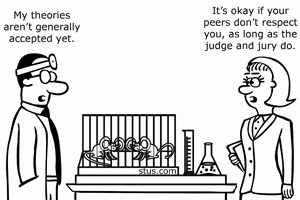 Frye and Daubert  both deal with judging evidence during a case. Each case contains the presentation of scientific fact, and the ruling on how legitimate the evidence is comes into play. Both cases have expert witnesses, which do not, in the eyes of the court, provide enough power in the testimony.
Frye and Daubert  both deal with judging evidence during a case. Each case contains the presentation of scientific fact, and the ruling on how legitimate the evidence is comes into play. Both cases have expert witnesses, which do not, in the eyes of the court, provide enough power in the testimony.
The cases not only differ in 70 years, but also differ on specific ruling. The issue of Frye was the general acceptance of method of evidence, in this case an early polygraph. These devices were relatively new, and did not carry enough successful documentation to be credible, according to the Frye court. This ruling effectively gave them the power to determine the potency of scientific evidence. During Daubert, the standard for reviewing evidence was changed. Instead of general acceptance, as Frye established, the court used the Federal Rules of Evidence as the main guidelines for determining the presentation of scientific evidence, a more specific and subjective approach.
Â
- Frye: United States v. Scheffer, 1997.
A United States Armed Forces airman was accused of using drugs since enlistment. He took a polygraph test, under which the examiner said his denial or use held accurate. A urine sample proved that methamphetamine was in his system. The ruling held Military Rule of Evidence 707, which predetermines polygraphs inadmissible, and the airman was convicted.
This case is often related to Frye in its similarities to doubting the polygraph as reputable evidence. Frye was possibly the inspiration for this rule, as it was remarkable in new evidence
Daubert: Â Kumho Tire Co. v. Carmichael, 1993
Patrick Carmichael was driving his minivan when a tire blew out, causing an accident with severe injuries and death of one passenger. His case’s evidence rested on that of a tire expert. The expert’s testimony was based on substance analysis and observation, which Kumho said was insufficient. Carmichael lost, on basis of rule 702, Federal Rules of Evidence, and the Daubert ruling.
In this case, the court exempted this presentation of evidence because of its nature. Here, the court’s basic judgement pertained to the type of evidence being either scientific or technical.

Omg such a cute comic!!!